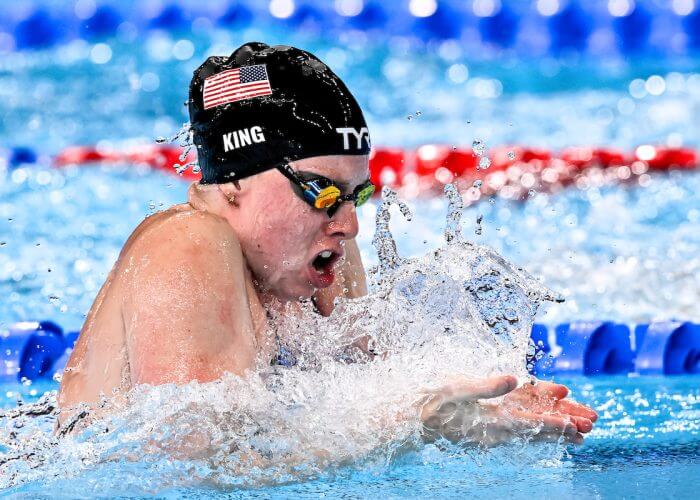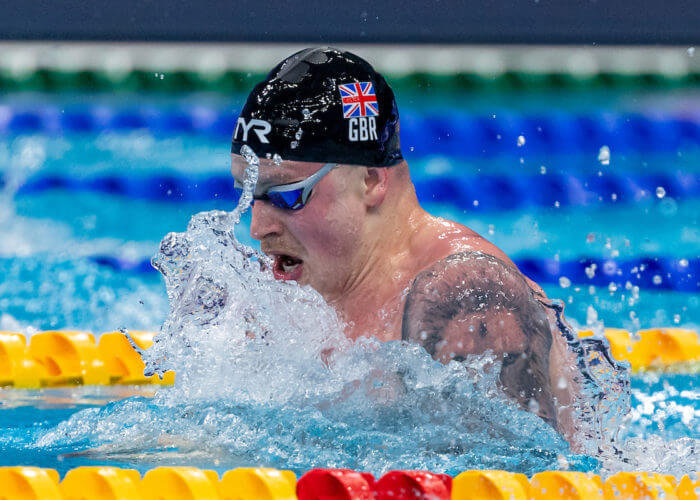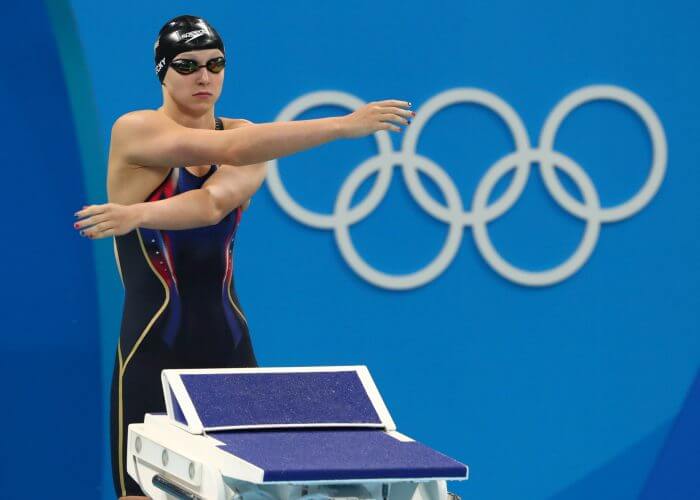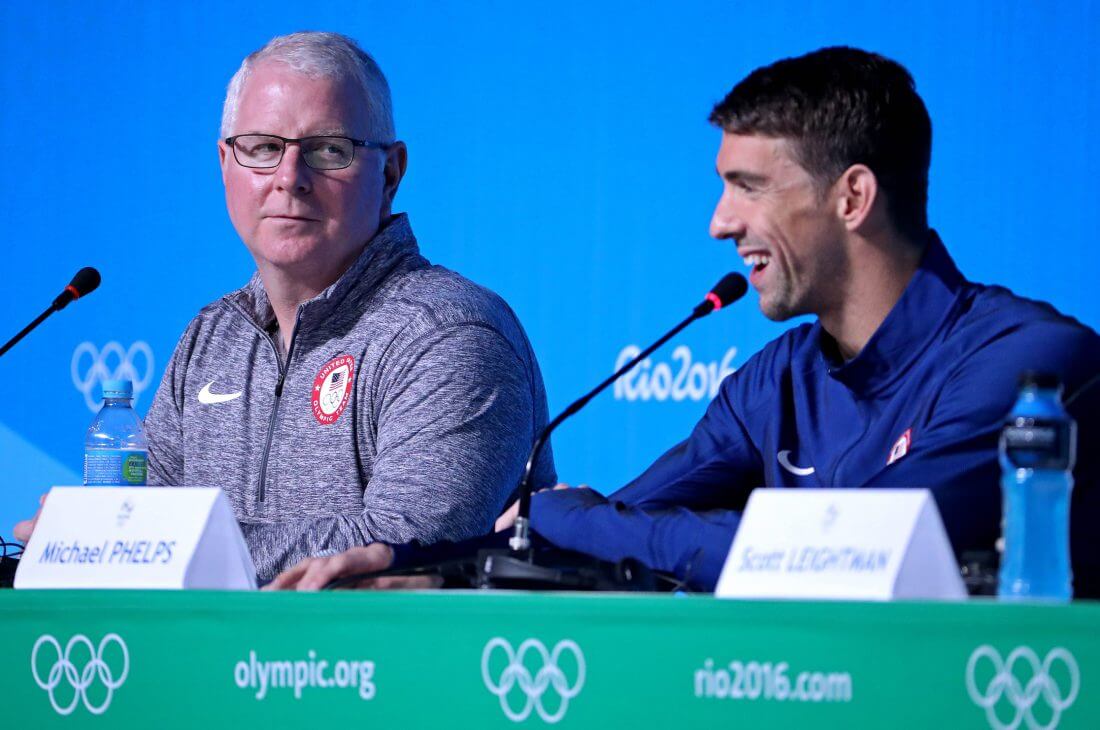On This Date: When the Stars Came Out – a Golden Night to Remember at the Rio Olympics
Doesn’t feel like it, but it’s been nine years since the 2016 Olympic Games in Rio de Janeiro. The final Olympiad for Michael Phelps. The trifecta of Katie Ledecky. Mack Horton’s epic defeat of Sun Yang. The dominance of Katinka Hosszu.
We could roll out several other highlights from Rio, but the point of this piece is to celebrate what unfolded nine years ago on this day – August 7, 2016. The evening session that date was nothing short of spectacular, a mix of male and female excellence featuring some of the greatest athletes the sport has seen.
There were four finals at the Olympic Aquatics Centre on 8/7/16. Not one failed to thrill, and three produced world-record performances. And for a little extra drama, there was the finger-wagging duel between Lilly King and Russia’s Yuliya Efimova during the semifinals of the 100 breaststroke.
If you don’t remember that night, we’ve got you covered. Enjoy this memory-lane trip to one of swimming’s greatest nights of all-time.
Sarah Sjostrom Destroys World Record in the 100 Butterfly
Sarah Sjostrom — Photo Courtesy: Becca Wyant
As Sarah Sjostrom prepared for the final of the 100-meter butterfly, she wasn’t yet a dominant force in the sport. Sure, Sjostrom was a world champion. But she entered Rio without an Olympic medal, having struggled at the previous Games in London. In 2012, Sjostrom was the fourth-place finisher in the 100 butterfly and failed to advance out of the semifinals in the 50 freestyle, 100 freestyle and 200 freestyle.
The 2016 Games shifted her narrative.
After easily qualifying first in the prelims and semifinals of the 100 butterfly, Sjostrom crushd the competition in the final, clocking a world record of 55.48. That performance handed the Swede a victory of nearly a second over Canadian 16-year-old Penny Oleksiak (55.46), with defending champion Dana Vollmer claiming bronze in 56.63.
Sjostrom didn’t just shave .16 off her previous world record, she ended her Olympic drought and gathered momentum. Her Rio Games also included a silver medal in the 200 freestyle and a bronze medal in the 100 freestyle.
“I had some doubts, but it was absolutely amazing,” Sjostrom said. “That I could handle the pressure, and in addition beat the world record. I didn’t see at first that it was a world record. I just saw that I won. It was awesome to do my fastest race in an Olympic final.”
A Finger-Wagging Showdown

Lilly King of United States of America competes in the swimming 100m Breaststroke Women Semifinals during the Paris 2024 Olympic Games at La Defense Arena in Paris (France), July 28, 2024.
Although the gold medal in the women’s 100 breaststroke was not awarded until the next night, there was no shortage of drama during the event’s semifinals. After Yuliya Efimova won the first semifinal in 1:05.72, the Russian waved her finger to the cameras, which Lilly King saw in the ready room. Efimova’s gesture was a clear response to King wagging her finger during prelims.
In the second semifinal, undoubtedly fueled by Efimova’s actions, King earned the top seed for the final in 1:05.70. As cameras focused on King, she delivered finger wag back at her rival. King also expressed her feelings on Efimova’s presence at the Games, given the Russian had previously served a doping suspension.
“Basically, what happened this morning was that I finished and then I waved my finger a little bit, because that’s kind of how I am,” King said. “Then tonight, just now, Yuliya got done with her swim and I am watching in the ready room, and there she is shaking her finger. So then I got done, and I beat her time, so I waved my finger again. People probably think I am serving it up a little bit but that is just how I am. That’s just my personality. I’m not this sweet little girl. That’s not who I am. If I do need to stir it up to put a little fire under my butt, or anybody else, then that’s what I’m going to do.”
Adam Peaty Storms to First Olympic Gold

Photo Courtesy: Giorgio Perottino / Deepbluemedia / Insidefoto
There wasn’t any doubt whether Great Britain’s Adam Peaty would win the gold medal in the 100 breaststroke in Rio. The real question: How fast could he go?
Peaty was on the attack the moment he stepped onto the deck in Brazil. A day before the final, Peaty set a world record of 57.55 in the heats of the 100 breaststroke, then went the No. 2 time in history in the semifinals, with a mark of 57.62. No one in the field was within a second of the British star, making the final a battle between Peaty and the clock.
In the final, Peaty surged to the front of the field and made the turn more than a half-second ahead of South African Cameron van der Burgh, the reigning champion. Over the last 50 meters, Peaty extended his lead and finally touched the wall in 57.13, slicing .42 off his day-old world record. Van der Burgh was second, an well behind in 58.69. To this day, only Peaty has bettered the time that won him his first Olympic crown.
“I did it for my country and that means so much for me,” Peaty said.
The First Domino in the Trifecta for Katie Ledecky

Photo Courtesy: Rob Schumacher-USA TODAY Sports
A year before the Rio Games, Katie Ledecky starred at the 2015 World Championships in Kazan, where she won gold medals in the 200 freestyle, 400 freestyle, 800 freestyle and 1500 freestyle. Because the 1500 freestyle wasn’t added to the Olympic program until the 2020 Games in Tokyo, Ledecky didn’t get the chance to duplicate the feat. Still, there was other history to chase.
At the Olympic level, only American Debbie Meyer at the 1968 Games in Mexico City had swept the 200, 400 and 800 freestyles. To join Meyer, Ledecky would first have to negotiate the 400 freestyle. Indeed, it was a simple task for the distance ace, as she blazed to a world-record time of 3:56.46, which was nearly two seconds faster than her previous standard of 3:58.37. More, she beat silver medalist Jazz Carlin of Great Britain by almost five seconds.
With the 400 freestyle title secure, Ledecky matched Meyer by capturing gold medals in the 200 freestyle and 800 freestyle, the longer distance a complement to her title in that event from 2012. Ledecky also anchored the United States to gold in the 800 freestyle relay and to silver in the 400 freestyle relay.
“When she does that, part of you is in awe and part of you is trying like crazy to catch up to her,” said American Leah Smith, who was the bronze medalist. “I knew she was going to win. … But when I saw her take off with 150 meters to go, I knew she was onto something special. It’s kind of fun because you hear the crowd going insane and you try to pretend it’s for you, even though you know it’s for Katie.”
United States Reclaims 400 Freestyle Relay Gold
The Olympic back-and-forth between the United States and France in the 400 freestyle relay began at the 2008 Games, in Beijing. Of course, that edition witnessed Jason Lezak rally Team USA to an improbable victory by running down Frenchman Alain Bernard on the anchor leg. Four years later, France reversed the outcome, as Yannick Agnel delivered come-from-behind heroics of his own.
In Rio, the United States regained the throne.
Caeleb Dressel (48.10) and Mehdy Metella (48.08) were basically even as the leadoff swimmers, but Michael Phelps changed the dynamic of the race on the second leg. While Phelps and Fabien Gilot were deadlocked at the 150-meter turn, Phelps’ powerful underwater work propelled him to a half-body-length edge and put the Americans in command. At the touch, Phelps’ split of 47.12 was more than a second quicker than the 48.20
On the way to a 47.12 split, compared to the 48.20 of Gilot, Phelps gave Team USA a cushion. The third leg saw Ryan Held go 47.73, with France’s Florent Manaudou cutting into his country’s deficit with a 47.14 effort. On the anchor leg, Nathan Adrian wasn’t about to let France rally, as he split 46.97, to the 47.11 of Jeremy Stravius.
“This relay means so much to us,” Phelps said. “It feels good to get it back.”
A Special Night
Yes, August 7, 2016 will do down as a grand night in swimming history. Clutch performances. World records. Drama. Bad Blood. It had it all.
